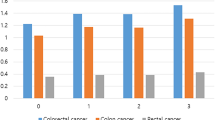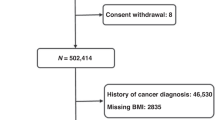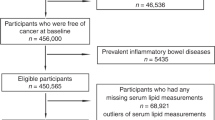Abstract
Objective:
Because of the high incidence of recurrent colorectal adenomas, regular surveillance by colonoscopy is recommended. However, there is still a shortage of information on the factors that influence the incidence of recurrent colorectal adenomas in patients with a history of these lesions. The aim of this study was to determine the association between the development of recurrent colorectal adenomas, metabolic syndrome and obesity.
Subjects and methods:
The hospital-based cohort was composed of 193 patients who had recurrent colorectal adenomas removed between January 2002 and December 2003. The Cox proportional hazard model was used to determine hazard ratio (HR) and 95% confidence interval (CI) between obesity, metabolic syndrome and other factors, and the incidence of recurrent adenomatous polyps.
Results:
The mean follow-up period was 4.8 person-years. In all, 78 of the patients (40.4%) had recurrent colorectal adenomas. In the overall recurrent adenoma group, significant associations between metabolic syndrome (HR, 1.33; 95% CI, 1.02–1.73), waist circumference (WC) ⩾90 cm (HR, 1.42; 95% CI, 1.06–1.90) and waist–hip ratio (WHR) ⩾0.9 (HR, 2.03; 95% CI, 1.55–2.68) were found. Moreover, advanced adenomas were significantly associated with metabolic syndrome (HR, 2.81; 95% CI, 1.86–4.25), body mass index ⩾25 kg m−2 (HR, 2.69; 95% CI, 1.64–4.42), WC (HR, 2.16; 95% CI, 1.31–3.54) and WHR (HR, 1.99; 95% CI, 1.28–3.11). In addition, current smoking (HR, 2.60; 95% CI, 1.09–6.25) and alcohol consumption (HR, 2.20; 95% CI, 1.10–4.39) were also significantly associated with recurrent advanced adenoma.
Conclusion:
Metabolic syndrome and obesity were significantly associated with the development of recurrent colorectal adenomas in Korean adult males. Furthermore, these associations were more strongly associated with advanced adenomas.
This is a preview of subscription content, access via your institution
Access options
Subscribe to this journal
Receive 12 print issues and online access
$259.00 per year
only $21.58 per issue
Buy this article
- Purchase on Springer Link
- Instant access to full article PDF
Prices may be subject to local taxes which are calculated during checkout
Similar content being viewed by others
References
Jung KW, Park S, Kong HJ, Won YJ, Boo YK, Shin HR et al. Cancer statistics in Korea: incidence, mortality and survival in 2006–2007. J Korean Med Sci 2010; 25: 1113–1121.
Pignone M, Rich M, Teutsch SM, Berg AO, Lohr KN . Screening for colorectal cancer in adults at average risk: a summary of the evidence for the U.S. Preventive Services Task Force. Ann Intern Med 2002; 137: 132–141.
Winawer SJ, Zauber AG, Fletcher RH, Stillman JS, O′Brien MJ, Levin B et al. Guidelines for colonoscopy surveillance after polypectomy: a consensus update by the US Multi-Society Task Force on Colorectal Cancer and the American Cancer Society. CA Cancer J Clin 2006; 56: 143–159; quiz 184–185.
Levin B, Lieberman DA, McFarland B, Smith RA, Brooks D, Andrews KS et al. Screening and surveillance for the early detection of colorectal cancer and adenomatous polyps, 2008: a joint guideline from the American Cancer Society, the US Multi-Society Task Force on Colorectal Cancer, and the American College of Radiology. CA Cancer J Clin 2008; 58: 130–160.
Nava H, Carlsson G, Petrelli NJ, Herrera L, Mittelman A . Follow-up colonoscopy in patients with colorectal adenomatous polyps. Dis Colon Rectum 1987; 30: 465–468.
Neugut AI, Johnsen CM, Forde KA, Treat MR . Recurrence rates for colorectal polyps. Cancer 1985; 55: 1586–1589.
Woolfson IK, Eckholdt GJ, Wetzel CR, Gathright Jr JB, Ray JE, Hicks TC et al. Usefulness of performing colonoscopy one year after endoscopic polypectomy. Dis Colon Rectum 1990; 33: 389–393.
Hofstad B, Vatn MH, Andersen SN, Huitfeldt HS, Rognum T, Larsen S et al. Growth of colorectal polyps: redetection and evaluation of unresected polyps for a period of three years. Gut 1996; 39: 449–456.
Hofstad B, Vatn M, Larsen S, Osnes M . Growth of colorectal polyps: recovery and evaluation of unresected polyps of less than 10 mm, 1 year after detection. Scand J Gastroenterol 1994; 29: 640–645.
Winawer S, Fletcher R, Rex D, Bond J, Burt R, Ferrucci J et al. Colorectal cancer screening and surveillance: clinical guidelines and rationale-Update based on new evidence. Gastroenterology 2003; 124: 544–560.
Bond JH . Polyp guideline: diagnosis, treatment, and surveillance for patients with colorectal polyps. Practice Parameters Committee of the American College of Gastroenterology. Am J Gastroenterol 2000; 95: 3053–3063.
Morita T, Tabata S, Mineshita M, Mizoue T, Moore MA, Kono S . The metabolic syndrome is associated with increased risk of colorectal adenoma development: the Self-Defense Forces Health Study. Asian Pac J Cancer Prev 2005; 6: 485–489.
Wang YY, Lin SY, Lai WA, Liu PH, Sheu WH . Association between adenomas of rectosigmoid colon and metabolic syndrome features in a Chinese population. J Gastroenterol Hepatol 2005; 20: 1410–1415.
Liu CS, Hsu HS, Li CI, Jan CI, Li TC, Lin WY et al. Central obesity and atherogenic dyslipidemia in metabolic syndrome are associated with increased risk for colorectal adenoma in a Chinese population. BMC Gastroenterol 2010; 10: 51.
Kim JH, Lim YJ, Kim YH, Sung IK, Shim SG, Oh SO et al. Is metabolic syndrome a risk factor for colorectal adenoma? Cancer Epidemiol Biomarkers Prev 2007; 16: 1543–1546.
Executive Summary of The Third Report of The National Cholesterol Education Program (NCEP) Expert Panel on Detection, Evaluation, And Treatment of High Blood Cholesterol In Adults (Adult Treatment Panel III). JAMA 2001; 285: 2486–2497.
Park HS, Kim SM, Lee JS, Lee J, Han JH, Yoon DK et al. Prevalence and trends of metabolic syndrome in Korea: Korean National Health and Nutrition Survey 1998–2001. Diabetes Obes Metab 2007; 9: 50–58.
Lee SY, Park HS, Kim DJ, Han JH, Kim SM, Cho GJ et al. Appropriate waist circumference cutoff points for central obesity in Korean adults. Diabetes Res Clin Pract 2007; 75: 72–80.
Lieberman DA, Weiss DG, Bond JH, Ahnen DJ, Garewal H, Chejfec G . Use of colonoscopy to screen asymptomatic adults for colorectal cancer. Veterans Affairs Cooperative Study Group 380. N Engl J Med 2000; 343: 162–168.
Imperiale TF, Wagner DR, Lin CY, Larkin GN, Rogge JD, Ransohoff DF . Results of screening colonoscopy among persons 40–49 years of age. N Engl J Med 2002; 346: 1781–1785.
Kopp W . High-insulinogenic nutrition--an etiologic factor for obesity and the metabolic syndrome? Metabolism 2003; 52: 840–844.
Giovannucci E, Ascherio A, Rimm EB, Colditz GA, Stampfer MJ, Willett WC . Physical activity, obesity, and risk for colon cancer and adenoma in men. Ann Intern Med 1995; 122: 327–334.
Kune GA, Kune S, Watson LF . Body weight and physical activity as predictors of colorectal cancer risk. Nutr Cancer 1990; 13: 9–17.
Le Marchand L, Wilkens LR, Mi MP . Obesity in youth and middle age and risk of colorectal cancer in men. Cancer Causes Control 1992; 3: 349–354.
Jacobs ET, Martinez ME, Alberts DS, Jiang R, Lance P, Lowe KA et al. Association between body size and colorectal adenoma recurrence. Clin Gastroenterol Hepatol 2007; 5: 982–990.
van Stolk RU, Beck GJ, Baron JA, Haile R, Summers R . Adenoma characteristics at first colonoscopy as predictors of adenoma recurrence and characteristics at follow-up. The Polyp Prevention Study Group. Gastroenterology 1998; 115: 13–18.
Martinez ME, Sampliner R, Marshall JR, Bhattacharyya AK, Reid ME, Alberts DS . Adenoma characteristics as risk factors for recurrence of advanced adenomas. Gastroenterology 2001; 120: 1077–1083.
Avidan B, Sonnenberg A, Schnell TG, Leya J, Metz A, Sontag SJ . New occurrence and recurrence of neoplasms within 5 years of a screening colonoscopy. Am J Gastroenterol 2002; 97: 1524–1529.
Ashbeck EL, Jacobs ET, Martinez ME, Gerner EW, Lance P, Thompson PA . Components of metabolic syndrome and metachronous colorectal neoplasia. Cancer Epidemiol Biomarkers Prev 2009; 18: 1134–1143.
Bird CL, Frankl HD, Lee ER, Haile RW . Obesity, weight gain, large weight changes, and adenomatous polyps of the left colon and rectum. Am J Epidemiol 1998; 147: 670–680.
Giovannucci E, Colditz GA, Stampfer MJ, Willett WC . Physical activity, obesity, and risk of colorectal adenoma in women (United States). Cancer Causes Control 1996; 7: 253–263.
Boutron-Ruault MC, Senesse P, Meance S, Belghiti C, Faivre J . Energy intake, body mass index, physical activity, and the colorectal adenoma-carcinoma sequence. Nutr Cancer 2001; 39: 50–57.
Henriksen EJ . Invited review: effects of acute exercise and exercise training on insulin resistance. J Appl Physiol 2002; 93: 788–796.
Nilsen TI, Vatten LJ . Prospective study of colorectal cancer risk and physical activity, diabetes, blood glucose and BMI: exploring the hyperinsulinaemia hypothesis. Br J Cancer 2001; 84: 417–422.
Wu AH, Paganini-Hill A, Ross RK, Henderson BE . Alcohol, physical activity and other risk factors for colorectal cancer: a prospective study. Br J Cancer 1987; 55: 687–694.
Heineman EF, Zahm SH, McLaughlin JK, Vaught JB . Increased risk of colorectal cancer among smokers: results of a 26-year follow-up of US veterans and a review. Int J Cancer 1994; 59: 728–738.
Jacobson JS, Neugut AI, Murray T, Garbowski GC, Forde KA, Treat MR et al. Cigarette smoking and other behavioral risk factors for recurrence of colorectal adenomatous polyps (New York City, NY, USA). Cancer Causes Control 1994; 5: 215–220.
Salaspuro MP . Alcohol consumption and cancer of the gastrointestinal tract. Best Pract Res Clin Gastroenterol 2003; 17: 679–694.
van Rijn JC, Reitsma JB, Stoker J, Bossuyt PM, van Deventer SJ, Dekker E . Polyp miss rate determined by tandem colonoscopy: a systematic review. Am J Gastroenterol 2006; 101: 343–350.
Acknowledgements
This work was supported by the Priority Research Center Program through the National Research Foundation of Korea (NRF) funded by the Ministry of Education, Science, and Technology (2009-009453).
Author information
Authors and Affiliations
Corresponding author
Ethics declarations
Competing interests
The authors declare no conflict of interest.
Rights and permissions
About this article
Cite this article
Kim, MC., Jung, S., Kim, CS. et al. Metabolic syndrome is associated with increased risk of recurrent colorectal adenomas in Korean men. Int J Obes 36, 1007–1011 (2012). https://doi.org/10.1038/ijo.2011.177
Received:
Revised:
Accepted:
Published:
Issue Date:
DOI: https://doi.org/10.1038/ijo.2011.177
Keywords
This article is cited by
-
Elevated serum triglyceride predicts recurrence of colorectal polyps in patients with advanced adenomas
Lipids in Health and Disease (2020)
-
Epidemiology and biology of physical activity and cancer recurrence
Journal of Molecular Medicine (2017)
-
Weight Change and Obesity Are Associated with a Risk of Adenoma Recurrence
Digestive Diseases and Sciences (2016)



